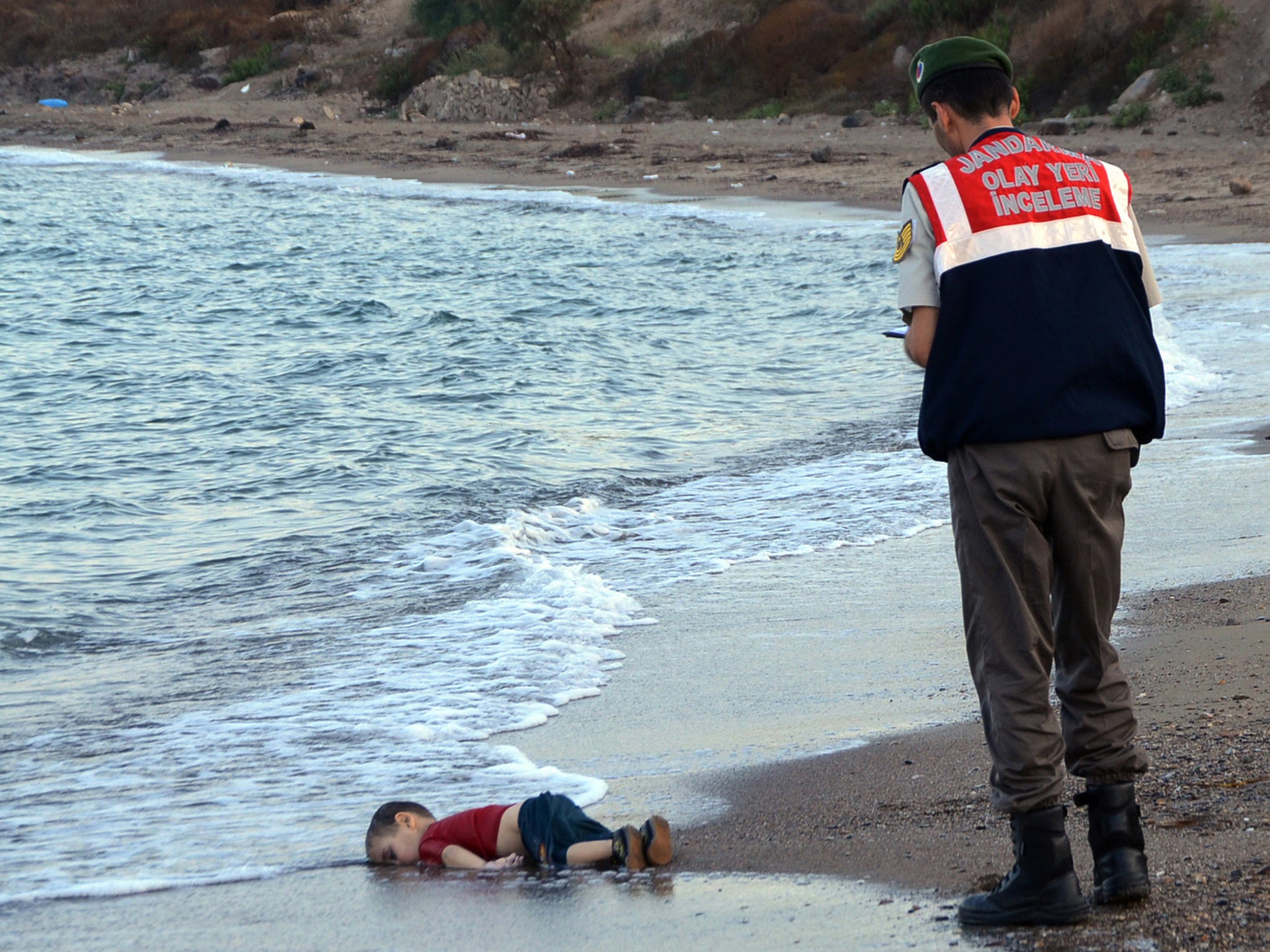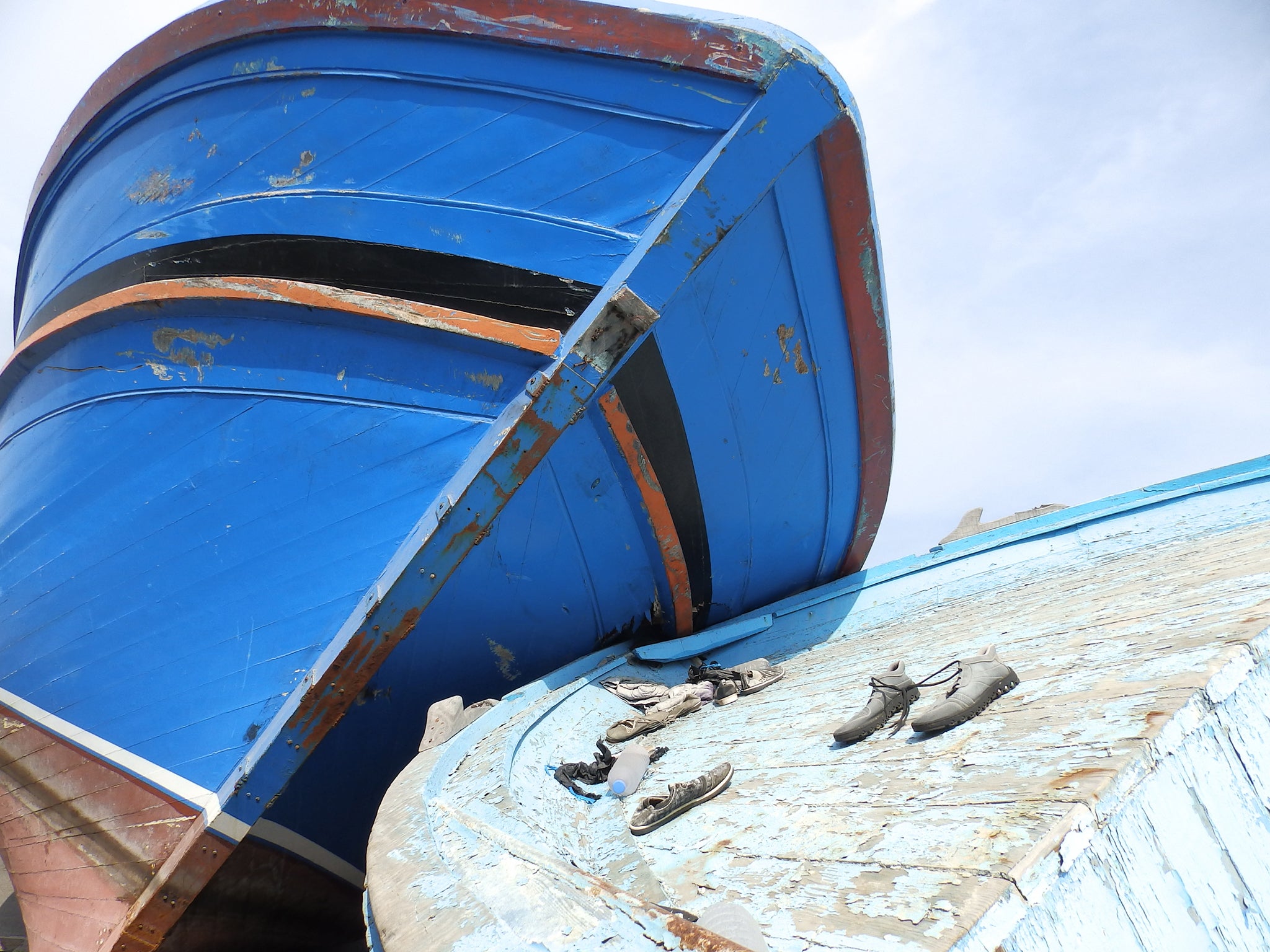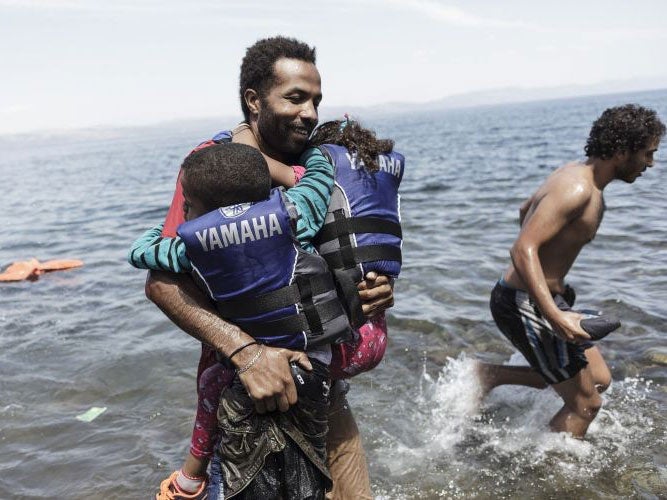Alan Kurdi’s death changed the global conversation on the refugee crisis – for a short time
Mediterranean refugee crisis, 2014-present: Photographs of the Syrian boy’s body sparked an international outpouring of compassion towards refugees that has not been replicated since, Lizzie Dearden writes

Alan Kurdi was not the first child to die during the Mediterranean refugee crisis, nor the last. By the time the three-year-old Syrian boy’s body was found on a Turkish beach on 2 September 2015, more than 6,000 men, women and children had drowned attempting desperate sea crossings to Europe. Thousands more have died since.
If Alan’s body had not been spotted by a Turkish press photographer, his death might have passed the world by, as theirs have. But by capturing that image, showing Alan appearing almost asleep in the shallows, wearing the red T-shirt and shorts his parents had dressed him in for their journey to Greece, Nilüfer Demir changed the international conversation on the “migrant crisis”.
The Independent was the first British news outlet to publish her photograph online, after reporters saw it circulated on Twitter by people calling for European governments to act.
The decision sparked fierce debate among editors over whether we should publish the emotive image that clearly showed the dead child’s face.
Doing so would go against normal aspects of our ethical code. The image was graphic, and could be seen to intrude into the family’s privacy and grief.
At that stage, we did not know Alan’s name or anything about him, other than that Turkish authorities believed he was among the victims of the latest migrant boat sinking on the strait between Bodrum and Kos.
Should it be used unedited? In this case, the editors decided that it should. The Independent published the photo online under the question: “If these extraordinarily powerful images of a dead Syrian child washed up on a beach don't change Europe's attitude to refugees, what will?”
As every other newspaper carried photos of Alan on their front pages the following morning, we ran with the headline: “Somebody’s child.”
As our then-deputy managing editor, Will Gore, wrote at the time: “We published the image online and in print because we believed it was of a different order to pictures we have seen before of the refugee crisis – and was one that might at last lead to action by politicians. There was a manifest public interest in showing the horrific reality of human desperation.”
The photo was a visceral illustration of what I and other journalists had previously struggled to convey with words: the human cost of the refugee crisis.
Many campaigners and charities had been demanding action as the toll of dead and missing refugees in the Mediterranean Sea ran into the thousands.

A month before Alan’s death I was in Sicily, which had previously been the main arrival point in Europe for refugees fleeing Libya during its bloody civil war. The locals there were no stranger to the human toll of the refugee crisis, having discovered overloaded fishing vessels with dozens of dead bodies in the hold.
In Pozzallo, the signs of human misery were there for all to see at a picturesque harbour that had been turned into an impromptu graveyard of “ghost ships”. An empty water bottle here, a discarded jacket there. When I saw a shoe that had belonged to a small child, I vomited.
Days later, I talked to a teenage boy who had fled the Malian civil war and was picked up by a charity rescue ship. “They beat us in Libya, they held guns to our heads,” he told me. “They made us give them money and forced us to work.”
But before Alan’s death the endless reports of conflict, torture and migrant shipwrecks had garnered little response from the British government. The EU was deadlocked amid arguments over whether it should run rescue operations, and where arriving migrants should go.
But the response to Alan’s death was profound. Five days later, prime minister David Cameron announced that Britain would take 20,000 refugees from the camps on the borders of Syria over five years.
Revelations that Alan’s family had been trying to reach relatives in Canada had a significant impact on the country’s October 2015 federal elections, which saw Justin Trudeau’s party win power. As the photograph spread around the world, urgent calls were made between European leaders and Turkish president Recep Tayyip Erdoğan.
Six months later, they struck the EU-Turkey deal that attempted to cut crossings over the Aegean Sea by forcibly returning refugees reaching Greece to Turkey, while increasing official transfers from camps in the country.
The controversial deal, although purportedly aiming to stop boat disasters, was the start of a hardening of refugee policies throughout Europe. The EU no longer runs rescue operations in the Mediterranean Sea, and the charities that did have faced an onslaught of legal attacks in Italy and elsewhere.
MSF ship the Bourbon Argos, which I boarded as it rescued 900 people from boats off the Libyan coast in 2016, is among those no longer in operation and had previously been shot at by a coastguard vessel.
But the British government has been striking agreements with the governments of Libya and other human rights abusers on the main migrant routes through Africa in an attempt to stem the flow.
In November, the agreements were fiercely criticised by a parliamentary committee that said they had “fuelled human rights abuses, strengthened armed groups and undermined stability”.
The Foreign Affairs Committee said one person now dies for every six who reach Europe after departing from Libya, adding: “Under no circumstances should migrants be left to die as a deterrent to stop others arriving.”
The report barely caused a ripple in the British press, but while media coverage has been dwindling migrants have continued to attempt desperate journeys to Europe.
According to the UN’s latest count, more than 19,000 men, women and children have drowned in the Mediterranean Sea since January 2014. Thousands of survivors remain in limbo at refugee camps and reception centres in Italy and Greece.
Tima Kurdi, Alan’s aunt, later said she believed the global reaction to his death had saved other lives. “It was something about that picture,” she says. “God put the light on that picture to wake up the world.”
Many are wondering whether it will take another “Alan Kurdi moment” to make the world care once more.
Syrian refugee tells how he survived boat sinking in waters where Alan Kurdi drowned
Lizzie Dearden, 3 September 2015
A 20-year-old Syrian refugee has told how he almost drowned attempting the same voyage to Europe that killed Alan Kurdi.
Like the boy, whose body was washed up on a Turkish beach, Firas (not his real name) is one of thousands of people trying to reach safety on Greek islands over the Aegean Sea.
He was packed onto a rubber dinghy with more than a dozen other refugees but just 20 minutes into the journey on 24 August, the boat’s engine cut out.
Firas told aid workers from International Rescue Committee (IRC) UK the weather gradually worsened until six-foot waves were crashing into the boat and it started to sink.
He and three friends jumped into the sea and gave rubber rings to two teenagers who could not swim.

But as they battled to stay afloat, three Iraqi refugees clung to the sinking dinghy, with one man sending a goodbye message to his father. Firas, from Damascus, believes they and at least two others drowned. He was picked up by the Greek coastguard as he neared the shore of Lesbos after swimming for seven hours.
“Even if I knew the boat was going to sink, I would still have made the journey,” Firas told the IRC. “Even if I had to swim all the way from Turkey. It’s better to die trying than just die back in Syria.”
He and three friends jumped into the sea and gave rubber rings to two teenagers who could not swim.
But as they battled to stay afloat, three Iraqi refugees clung to the sinking dinghy, with one man sending a goodbye message to his father. Firas, from Damascus, believes they and at least two others drowned.
He was picked up by the Greek coastguard as he neared the shore of Lesbos after swimming for seven hours.
“Even if I knew the boat was going to sink, I would still have made the journey,” Firas told the IRC. “Even if I had to swim all the way from Turkey. It’s better to die trying than just die back in Syria.”
Join our commenting forum
Join thought-provoking conversations, follow other Independent readers and see their replies
Comments